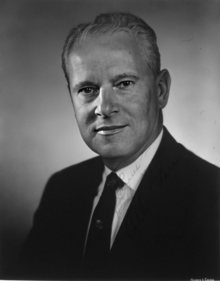
Back البرت جور ARZ آلبرت قور، سینیور AZB Albert Gore senior German آلبرت گور، سینیور Persian Albert Gore, Sr. Finnish Albert Arnold Gore, Sr. French Albert Gore Sr. Hausa אלברט גור האב HE Albert Arnold Gore (1907–1998) Hungarian Albert Gore senior Italian
Albert Gore | |
|---|---|
 Official portrait, c. 1953 | |
| United States Senator from Tennessee | |
| In office January 3, 1953 – January 3, 1971 | |
| Preceded by | Kenneth McKellar |
| Succeeded by | Bill Brock |
| Member of the U.S. House of Representatives from Tennessee's 4th district | |
| In office January 3, 1939 – December 4, 1944 | |
| Preceded by | John R. Mitchell |
| Succeeded by | Himself |
| In office January 3, 1945 – January 3, 1953 | |
| Preceded by | Himself |
| Succeeded by | Joe L. Evins |
| Personal details | |
| Born | Albert Arnold Gore December 26, 1907 Granville, Tennessee, U.S. |
| Died | December 5, 1998 (aged 90) Carthage, Tennessee, U.S. |
| Political party | Democratic |
| Spouse | |
| Children |
|
| Alma mater | Middle Tennessee State University (BA) Nashville School of Law (LLB) |
| Military service | |
| Allegiance | |
| Branch/service | |
| Years of service | 1944–1945 |
| Rank | Private |
| Unit | Allied Military Government for Occupied Territories |
| Battles/wars | World War II |
Albert Arnold Gore (December 26, 1907 – December 5, 1998) was an American politician who served as a United States senator from Tennessee from 1953 to 1971. A member of the Democratic Party, he previously served as a U.S. representative from the state's 4th congressional district from 1939 to 1953. He was the father of Al Gore, who served as the 45th vice president of the United States from 1993 until 2001, and held Tennessee's other U.S. Senate seat from 1985 to 1993. A native of Granville, Tennessee, Gore graduated from Middle Tennessee State Teachers College and taught school. From 1932 to 1936 he was superintendent of schools for Smith County. He attended the Nashville Y.M.C.A. Night Law School, now the Nashville School of Law, from which he graduated in 1936.
He was admitted to the bar later that year, and also accepted appointment as Commissioner of the Tennessee Department of Labor, a position he held until 1937. In 1938, Gore was elected to the United States House of Representatives from Tennessee's 4th congressional district. He was twice re-elected, and served from 1939 until resigning in December 1944. During World War II, Gore briefly served in the United States Army as part of a program that enabled members of Congress to join the military incognito to obtain firsthand information on training, readiness, and treatment of service members. He served from December 1944 to March 1945, when he was discharged and took the House seat to which he had been elected again in November 1944. He was thereafter re-elected in 1946, 1948, and 1950, and served from 1945 until 1953. In 1952, Gore was a successful candidate for the U.S. Senate. He was reelected in 1958 and 1964, and served from January 1953 to January 1971. Gore was an unsuccessful candidate for reelection in 1970.
In the Senate, Gore championed the Federal Aid Highway Act of 1956. In 1956, he also opposed the segregationist Southern Manifesto, but he voted against the Civil Rights Act of 1964. Gore reversed course a year later and supported the Voting Rights Act of 1965. During the presidency of Lyndon Johnson, Gore backed most of Johnson's Great Society programs. Gore's 1970 defeat was blamed in part on his opposition to continuing U.S. involvement in the Vietnam War. After leaving the Senate, Gore practiced and taught law at Vanderbilt University. He later served as a vice president of the Occidental Petroleum Company and was a member of its board of directors. Gore also served on the boards of directors of several other companies and operated a farm on which he bred Angus cattle. Gore died in Carthage, Tennessee on December 5, 1998, and was buried at Carthage's Smith County Memorial Gardens.